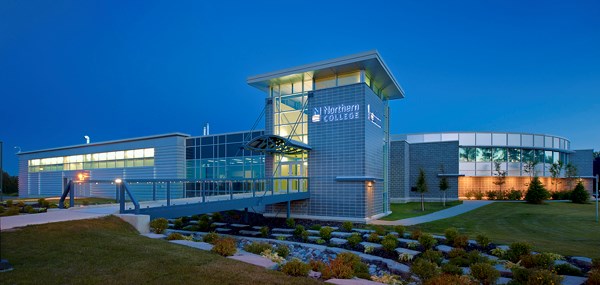A selection of university-level courses could be offered through Northern College in Timmins as early as 2019, thanks to a partnership with Sault Ste. Marie’s Algoma University.
The two educational institutions have a long-established relationship going back seven years. But following a recent study into the possibility of setting up a new university in Timmins, it’s been determined to continue the relationship.
“One of the stipulations in the model that we have with Algoma University is that we don't want to see a predatory kind of practice within the community,” said Northern College president Fred Gibbons. “We would like to approach things in a complementary fashion so that truly it's a win for the college, a win for the university, and a win for the students within the community.”
Northern College has mulled the idea of bringing university studies to Timmins for close to 50 years, Gibbons said, and last November, the school formalized the process by commissioning a feasibility study through the Northern Policy Institute, led by researcher Ken Coates.
Results from the study, A University for Timmins? Possibilities and Realities, suggested a stand-alone university isn’t realistic, given the close proximity of other universities, constrained government funding, and a limited pool of students to choose from, among other reasons. But what could work, the study recommended, is a partnership with an existing university.
Enter Algoma University. For the last seven years, the school has offered two undergraduate programs to Northern College students: the social service worker diploma program and the bachelor of community economic and development program, Gibbons said.
Students who have graduated from related Northern College programs have the option to continue their education in those programs through Algoma University. Gibbons estimates roughly 60 per cent of students choose to go into the workforce, while the remaining 40 per cent want to further their studies.
“Our relationship with Algoma has, I think, matured very nicely, because when students apply to the college diploma program, they’re also making joint application and therefore a joint offer of admission from Northern and Algoma concurrently,” Gibbons said.
“So if you get into the two-year diploma program at Northern College, you will at least get an offer of admission to Algoma once you’ve completed your diploma with Northern if you choose not to go into the workforce.”
After senior management teams from the two schools met last February to brainstorm ideas, they’ve established articulation agreements for three additional programs.
The first program is an undergraduate business program, slated to start being offered in September, 2019, which offers Northern grads admission into the third year of Algoma’s bachelor of business administration degree program. The second is the computer engineering studies program, which gives admission to Northern graduates entering Algoma’s third year computer engineering program.
While the third program is still being decided on, Gibbons said ideas include something in the area of environmental science or criminal justice.
All three programs would be offered in a classroom setting, which would be taught either by credentialed instructors within the community or by Algoma University staff. In some cases, new instructors may need to be hired for the positions.
Gibbons said Algoma is currently going through the formal channels to get the programming approved for the Timmins site before it goes ahead into implementation.
He calls the timing of the expanded programming “fortuitous,” as Northern College has been seeing an increase in the number of international students choosing to study in Timmins. Many attend college with a view to entering the workforce and eventually immigrating to Canada. But others want to continue on in their studies.
“We are hearing from a significant portion of the international students studying with us that they are looking now for university studies beyond college,” Gibbons said. “So, ‘Let's do the diploma program, but what else can you provide for us,’ and we would really be providing it through our on-site partner, in this case Algoma.”
Attracting international students has very much been on the radar of Northern College, and the North’s five other colleges, following the creation of the Study North recruitment initiative in 2014. Study North aims to attract students to Northern Ontario to study, with all six colleges working together instead of individually to entice students north.
Gibbons said the goal remains to encourage students to come north and stay north, to combat the outmigration of skills and talent.
Stay North is entering its fifth year of operation, after which it will be reviewed to determine its future.




